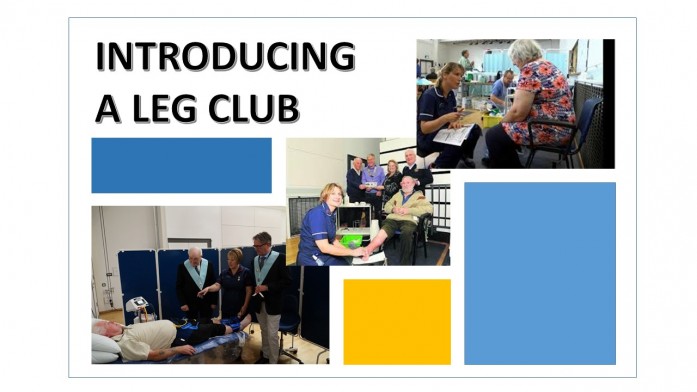Guest Blog by Amanda Brookes, Locality/Projects Manager – Bradford-On-Avon and Melksham
Anyone working in general practice cannot fail to be aware of the misery that leg ulcers bring to their patients; regular attendances and multiple medications, legs wrapped like the Michelin man, the discomfort and the smell. No wonder so many patients end up with depression and social isolation.
But, as I discovered, it doesn’t have to be that way.
In 2008 the practices I worked for established a provider company and won a bid to provide the Level 2 Leg Ulcer Contract to sixteen practices in West Wiltshire. As we developed our specialist team of nurses and HCAs it became clear to me that the treatment of leg ulcers was a neglected area and that patients were suffering unnecessarily; there had to be an alternative. At the same time, with my Business Manager head on, I was concerned with the costs of multiple attendances and the rising cost of specialist bandaging.
Although I am not a clinician, in 2010 I attended the annual conference of the Lindsay Leg Club Foundation and was immensely inspired by Ellie Lindsay OBE and the model for Leg Clubs which she had developed in the mid-nineties.
Ellie was an ex-District Nurse and had set up around 25 Leg Clubs, led by District Nurses who invite housebound, potentially socially isolated patients into a social setting for care and chat. Her results on healing and recurrence rates were excellent. I invited her to talk to our Leg Ulcer team and we were so impressed we began talks locally on how this model might be made to work in primary care.
For those who don’t know, a Leg Club is an evidence-based initiative which provides community-based treatment, health promotion, education, ongoing care and social activities for people of all age groups who are experiencing leg-related problems.
Following a merger with two smaller practices, our original patient base of 14,000 grew to over 20,000 which resulted in more patients with leg ulcers and a lack of space. This was the ideal push we needed and we began to pursue the Leg Club model in earnest.
The doctors and nurses I worked with were incredibly enthusiastic but it was difficult to gain interest from those who held the purse strings. So we began a very time-consuming and frustrating hunt for sources of money. It was at this time, after running a number of community events with charitable organisations, that I came to the realisation that leg ulcers are not sexy!
It became bit of a running joke with colleagues, every-time I met anyone who could help or would listen, I talked Leg Clubs! I’m afraid I became mildly obsessed and evangelical but it paid off in the end when the Friends of Bradford on Avon Community Health Care gave me £12,000 of funding. Others then followed.
And it turns out the model can very much be made to work in primary care. General practice nurses provide the drop-in clinical support (through six stations) in a local community hall and we have a Doppler machine as part of a patient’s first assessment. A committee made up of Leg Club members is in control of the social side which includes activities such as a Balance and Falls Class, structured short walks program, an arts group, access to a podiatrist, support from a care co-ordinator, dementia advisor and ad hoc speakers such as Carers Support and Age UK – all of which remain accessible to members even once their legs are healed.
We estimate that members coming to the Leg Club have saved the practice around 20 appointments a week. The well-leg regime has no funds attached – but as our recurrence rates fell over two years from 75% to 25% there is evidence that it is a cost effective model. Membership is at 600, and legs are now healed in an average of 12 weeks, whereas in 2014 it was 19-24 weeks.
It is a constant battle to raise funds for the social side but we have regular fund raising events and local industry partners are very important.
The patients love attending the Club and the nurses love it also because they are not constricted by time; consequently the atmosphere is positive and fun. The practice likes it because it has reduced the number of times this group of patients come to the surgery and in many cases, their mental wellbeing has improved.
If you are thinking of setting up a Leg Club yourself then I strongly recommend you contact the Lindsay Leg Club Foundation (information at www.legclub.org– and you’ll see us on there!)
There is a lot of planning, fundraising and awareness-raising to be done before a Leg Club opens. There needs to be a Champion or Lead with the passion to take this project forward; it’s hard work and needs on-going support once the club opens. Nurses need to be trained in the infection control standards for community based care as well as admin staff to learn how the patient record and audits are produced. The Leg Club Foundation carries out an audit once a year by an independent clinical consultant and keeps a check that all the standards are being met and are safe. The Club submits weekly audits and any corrections are fed back to us to rectify.
I know I have become evangelical about Leg Clubs, but for a reason. They do work clinically, they make business sense and they provide a better service for patients. But if you are still not convinced you can either watch our short video on the subject here or contact me via email at amanda.brookes@nhs.net


No Comments